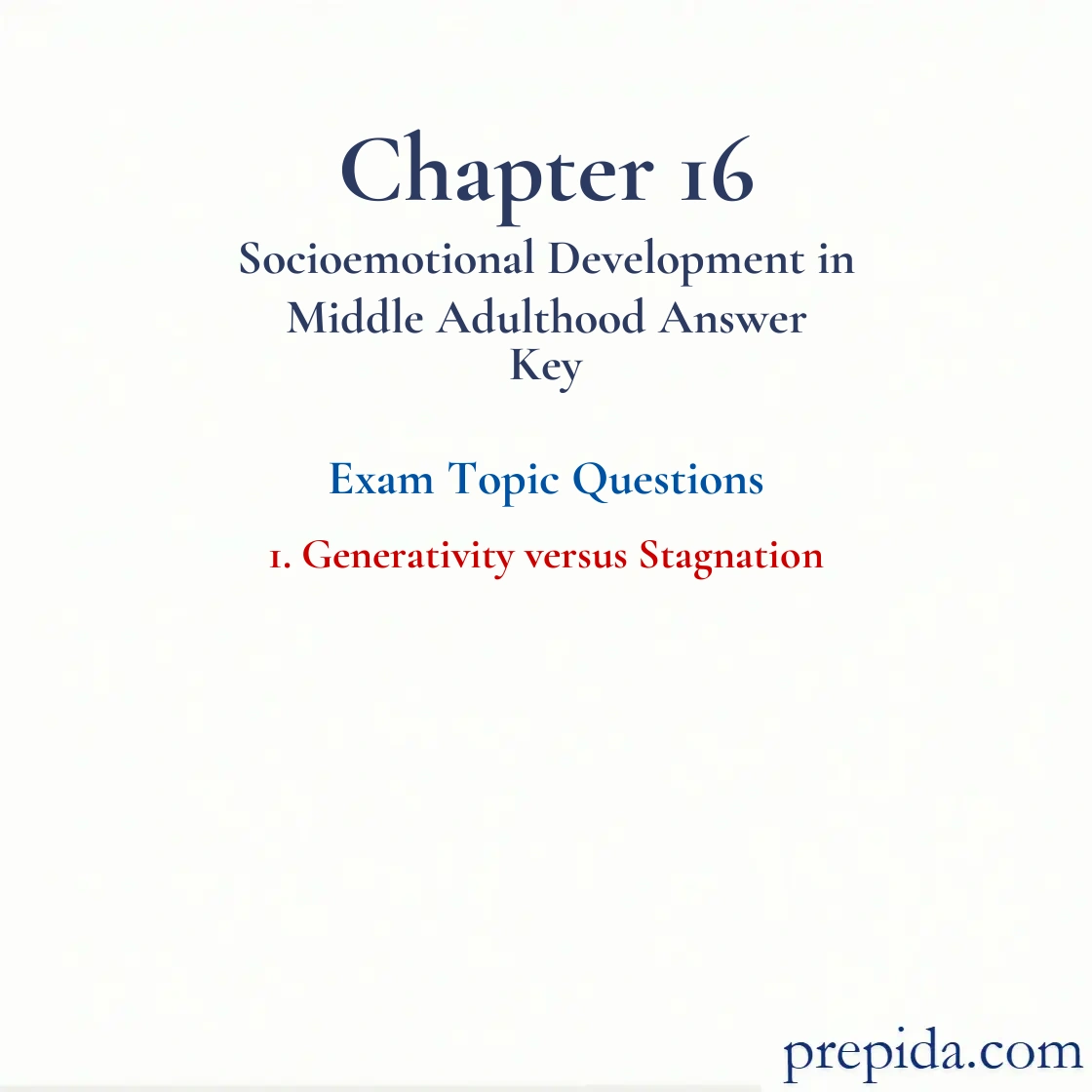
As he looks back at life, Chris realizes that his work was not as important to him as he believed and that he lost too much valuable time with his children. If he could do it over again, he would work less and spend more time with his children. According to Erikson, Chris is experiencing some degree of
- social rejection.
- apathy.
- generativity.
- stagnation.
Sensation: The product of the interaction between information and the sensory receptors—the eyes, ears, tongue, nostrils, and skin.
Saeko has committed herself to the continuation and improvement of society as a whole through her connection and relationship with their children and grandchildren. According to Erikson, she is
- self-absorbed.
- generative.
- stagnant.
- apathetic.
Epigenetic View: Emphasizes that development is the result of an ongoing, bidirectional interchange between heredity and environment.
In a longitudinal study of Smith College women, the desire for ________ increased as the participants aged from their thirties to their fifties.
- generativity
- self-concept
- stagnation
- self-absorption
Infinite Generativity: The ability to produce and comprehend an endless number of meaningful sentences using a finite set of words and rules.
Abdiel has three children. According to Erikson, he has achieved
- biological generativity.
- parental generativity.
- biological stagnation.
- cultural stagnation.
Infinite Generativity: The ability to produce and comprehend an endless number of meaningful sentences using a finite set of words and rules.
In Erikson's theory, adults strive for generativity to achieve a sense of
- immortality.
- recognition.
- achievement.
- omniscience.
Spirituality: Experiencing something beyond oneself in a transcendent manner and living in a way that benefits others and society.
Guillermo has taught his apprentices all the specialized techniques he has developed over the years as a carpenter. According to Erikson, he has achieved ________ generativity.
- biological
- parental
- work
- cultural
Jared is 50 years old. He has been working in a corporate law firm since the past 25 years. Even though he has been successful in his career, he realizes that he has done nothing for his children. According to Erikson's theory, Jared's realization indicates ________.
- perpetuity
- generativity
- self-actualization
- stagnation
Sensation: The product of the interaction between information and the sensory receptors—the eyes, ears, tongue, nostrils, and skin.
In Erikson's theory, ________ encompasses adults' desire to leave legacies of themselves to the next generation.
- self-actualization
- generativity
- self-absorption
- perpetuity
Infinite Generativity: The ability to produce and comprehend an endless number of meaningful sentences using a finite set of words and rules.
Which of the following is the seventh stage of Erikson's psychosocial theory?
- intimacy versus isolation
- integrity versus despair
- autonomy versus shame and doubt
- generativity versus stagnation
Erikson’s Theory: Includes eight stages of human development. Each stage consists of a unique developmental task that confronts individuals with a crisis that must be resolved.
Jacqueline nurtures and guides her children. According to Erik Erikson, she has achieved ________ generativity.
- biological
- parental
- work
- cultural
Placenta: A prenatal life-support system that consists of a disk-shaped group of tissues in which small blood vessels from the mother and offspring intertwine.
Which of the following statements is true of Erikson's stage of generativity versus stagnation?
- Universally, research refutes Erikson's theory that generativity is an important dimension of middle age.
- Generative adults usually refrain from committing themselves to the continuation and improvement of society as a whole.
- Generative adults develop a positive legacy of the self and then offer it as a gift to the next generation.
- Adults usually strive to achieve a kind of recognition through legacies.
Generational Inequity: The view that our aging society is being unfair to its younger members because older adults pile up advantages by receiving inequitably large allocations of resources.
Erikson proposed that middle-aged adults face a significant issue, which he termed
- intimacy versus isolation.
- integrity versus despair.
- generativity versus stagnation.
- autonomy versus shame and doubt.
Which of the following statements is true of George Vaillant's longitudinal studies of adulthood and aging?
- Factors such as having good coping skills and being thankful were linked with the "happy-well" category.
- Only individuals with normal weight were more likely to be alive and happy at 75 to 80 years of age.
- Intimacy in middle age was more strongly related than generativity whether individuals would have an enduring and happy marriage at 75 to 80 years of age.
- Wealth and income at age 50 were usually linked with being in the "happy-well" category at 75 to 80 years of age.
According to George Vaillant's longitudinal studies, ________ in middle age was more strongly related than intimacy to whether individuals would have an enduring and happy marriage at 75 to 80 years of age.
- generativity
- stagnation
- autonomy
- assuming a traditional gender role